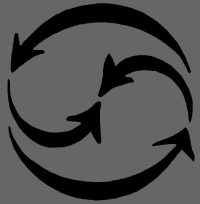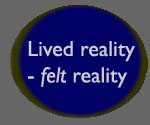"What did you think you were doing, playing Side Two of "Bringing It All Back Home" at full volume, seriously "stoned" on an old Indian recipe of yogurt, herbs and spices, and at a time when your life was in complete chaos?" This would be the obvious question, wouldn't it - asked from the position of hindsight? But this was 1969 and we did that sort of thing all the time. Anyway, Dylan begins that side harmlessly enough, with what has since become a well-loved favourite...
"Hey, Mister Tambourine Man, play a song for me
In the jingle jangle mornin' I'll come followin' you".
No sensible person would read into this the suggestion that we have reached some crucial point of no return - the time to place our final bets and await the spin of the wheel. On the other hand, some seeds are surely being planted...
"I'm ready to go anywhere, I'm ready for to fade, into my own parade
Cast your dancin' spell my way, I promise to go under it.... "
And during this and the two songs which follow, against a background of swirling harmonica and an acoustic guitar which ranges between a lilting serenade and a hammering on the door, Dylan heaps image upon image, wild, resonating, and beyond the zone of overkill. The man was no longer writing songs that could be said to carry any simple "message" - but this extraordinary sequence of tracks climaxes in something that still, I can only hear as a radical demand:-
"Leave your stepping-stones behind you, there's something that calls for you!
Forget the dead you've left, they will not follow you!
The vagabond who's rapping at your door
Is standing in the clothes that you once wore...
Strike another match, go start anew...
And it's all over now, baby blue!"
So that is what I heard. I knew then, that something beyond my personality had already begun to re-design my life for me, with no respect for the boundaries of what I might plan - or even imagine - for my own future. I heard great iron doors slamming and saw myself stumbling out into the winter weather. My home subsequently took on an oddly unfamiliar aspect; it was no longer quite recognizable as the place where I lived. However it was, that I had managed to feel "at home" in my past life, it had evidently been a piece of self-deception.
In those days we talked freely about "blowing each other's minds" - for it seemed that this was a genuine favour which one friend might gladly render to another. It was simply the other side of the craving so many of us felt: that we might break free from the pleasantly meaningless hell we had constructed for ourselves, out of habits of mind which had come to us so effortlessly, and which we had mistaken for our own personality.
The promise of those times, that sweet and sexy Revolution of Love, has now been severely broken - or so it seems to many of us today. In the paranoid wasteland of the new millennium, one would no longer consider it a kindness, to kick a person (friend or enemy) out into the bewildering light of day. Yet the need to discover a better way to live remains with us; and as one who counts themselves as lost in the wilderness now for more than 35 years, I cannot help but notice that there is still a severe shortage of useful maps.
The study which now follows is about something broader than my own personal journey. It is a progress report on my practical quest - which has been the attempt to join forces with those others who also recognize the need for maps and signposts - something to help us navigate the crazy space-time of the twentieth and twenty-first centuries.
This is also an exercise in the re-orientation which becomes possible after the kind of radical dis-orientation which Dylan propelled me into, on that September night of 1969. I bring to the project an acute sense of what it is like to feel at home, in contrast with the other feeling which I have learned to accept - of feeling radically disoriented and lost. Also, life still has a way of pitching me without ceremony upwards and downwards of this spectrum of lost-and-found. Out of this experience I have developed a finely-tuned sensitivity to the kind of Ariadne's threads, or the helpful signposts, that seem to promise - in some measure - to draw me home.
And this is also an invitation to the reader, to share in a new collective research. This is open to anyone who is willing to recognize that they, too, are lost in some kind of wilderness; it is open to you, if you believe that signalling our position to one another, combined with honest attempts to map the terrain around us, could be a first step towards a change for the better. I want us to search for ways we can build bridges between us - that might allow some real communication, in an era of collective cultural breakdown.
The talk of "maps", "signposts" and "bridges" may either seem to imply that I am preoccupied with physical space, or it may be taken as an extended metaphor for something that exists in "inner" or psychological space. But I have come to feel that the space between us needs to be negotiated first, before we start to consider what we might count as geographical or as psychological space. A genuine smile - even the flicker of recognition - between friends or strangers is a more profound signpost towards a possible better world, than almost anything that you can find in the conventionally styled "inner" and "outer" worlds.
I draw on a wide range of influences, as you will shortly be finding out. At the time when it all began for me there was, in particular, Carlos Castaneda's account of his apprenticeship to the Yaqui Indian sorcerer Juan Mateus. Castaneda's work helped to advance the process which had begun with Bringing It All Back Home, effectively booby-trapping my old reality and making it impossible for me to return to it. There was also Martin Buber, and his philosophy of radical human and trans-human encounter. He kept me trusting in a path that leads to the other side of chaos and the void - and which might have something to do with redemption. Buber's work has a deep affinity with the ancient Chinese philosophy of the Dao(1) and it happens that the classic Dao De Jing has been another significant companion for me. I have always wanted to create a New Dao which could somehow encompass the new directions, the new unfolding of life which is called for at our own unique juncture of history. And the name I have given it - this Dao for the Twenty-first Century - is: The Dao of Beginning Again.
The Chinese ideogram "Dao" is an ambiguous symbol that indicates a way, a vision, or a method. The expression: "beginning again" carries forward this sense of ambiguity; I have crafted the whole phrase in such a way that it lacks a settled meaning, and can float freely amongst a range of possibles:-
The need to begin again (because we have spoiled what we have made of our collective life so far).
The chance to begin again (a fresh start, as if we were born anew, trusting that we can do things better, or differently, this time).
Life beginning again (as it does with every new morning, and in every new generation).
The recurring nightmare beginning again (as some people re-live their childhood trauma, again and again).
I intend these shifting connotations to point towards the conflict I see within our deepest nature, which has to do with our instincts, traditions and customs. Which elements shall we count as something we are entrusted to take care of, to follow and to conserve? Which elements would it be better for us to overturn, or clear away, to make way for the new? The Dao of Beginning Again is the quest for some reconciliation between these conflicting drives - to bring them, in fact into the arena of method, of intelligent direction.







